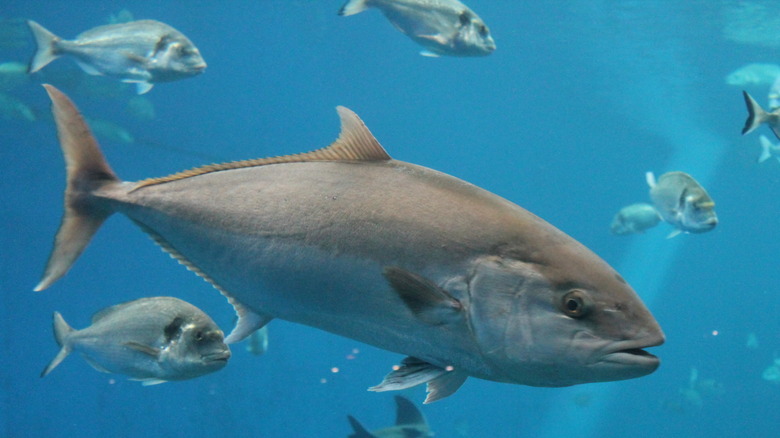Plant-Based Tuna Is Missing This One Important Aspect
With more than six million tons fished yearly, tuna is the most commercially valuable fish — but it comes from an increasingly limited source. While industrial fisheries have advanced the methods of harvesting the fish, covering up to 90% of global oceans (via NPR), the conservation of vulnerable tuna species — a few of which are included on the IUCN's Red List of endangered species — has evolved at a slower rate. Through global efforts and governments, more transparency has been required from industrial fisheries through the use of monitoring systems — however, if you've watched Netflix's documentary, "Seaspiracy," you may know that, conveniently, these systems aren't always in use.
The industry's lack of cooperation has serious consequences: According to the WWF, not only does it allow illegal and unregulated fishing, but it denies scientists access to important data on species like coral reefs, dolphins, sea turtles, and sharks that get caught in their nets while stripping away resources that should be benefitting coastal communities. As consumers become more aware of the industry's actions, including their role as the top ocean polluters (via Nature), some choose to remove the fish from their diets entirely, prompting plant-based replacements to appear on the market. From watermelon steaks and poke bowls to tomato nigiri, tuna is mocked in a few different ways — but each falls short on one thing, which, depending on your preference, could be good or bad.
The fishy aroma
Even if your tuna is fresh, it will have a smell — one that is naturally reminiscent of the ocean it came from. The same can be said for most other seafood and edible algae like spirulina that give off a somewhat fishy aroma. Unless the stench of your tuna is so overpowering that it's unappetizing, it's usually not a cause for concern. Particularly in canned tuna, the aroma is actually a histamine created in the cooking process that kills bacteria (via Leo Weekly). Even so, the smell can be off-putting, regardless if you like tuna or not. But when 80% of taste is connected to your sense of smell (via Science World), it's an important element for mock tunas to include in order to work as a true substitute.
Naturally, plant-based tuna is made from plant alternatives. Besides watermelons and tomatoes that are used to mimic tuna steaks and sushis, plant-based alternatives to packaged tunas are usually made out of some mix of legumes. Legumes have their own associated smell, one that's very different from that of fish. So instead of peeling open a pouch and preparing to be hit with a stench similar to your cat's food, plant-based tuna will smell more like canned beans — a much less pungent odor, but alas, it's nothing at all like real tuna. For this reason, The Take Out recommends using plant-based tuna alternatives in your non-tuna salads or other recipes where the flavors of additional ingredients help dress it up.

